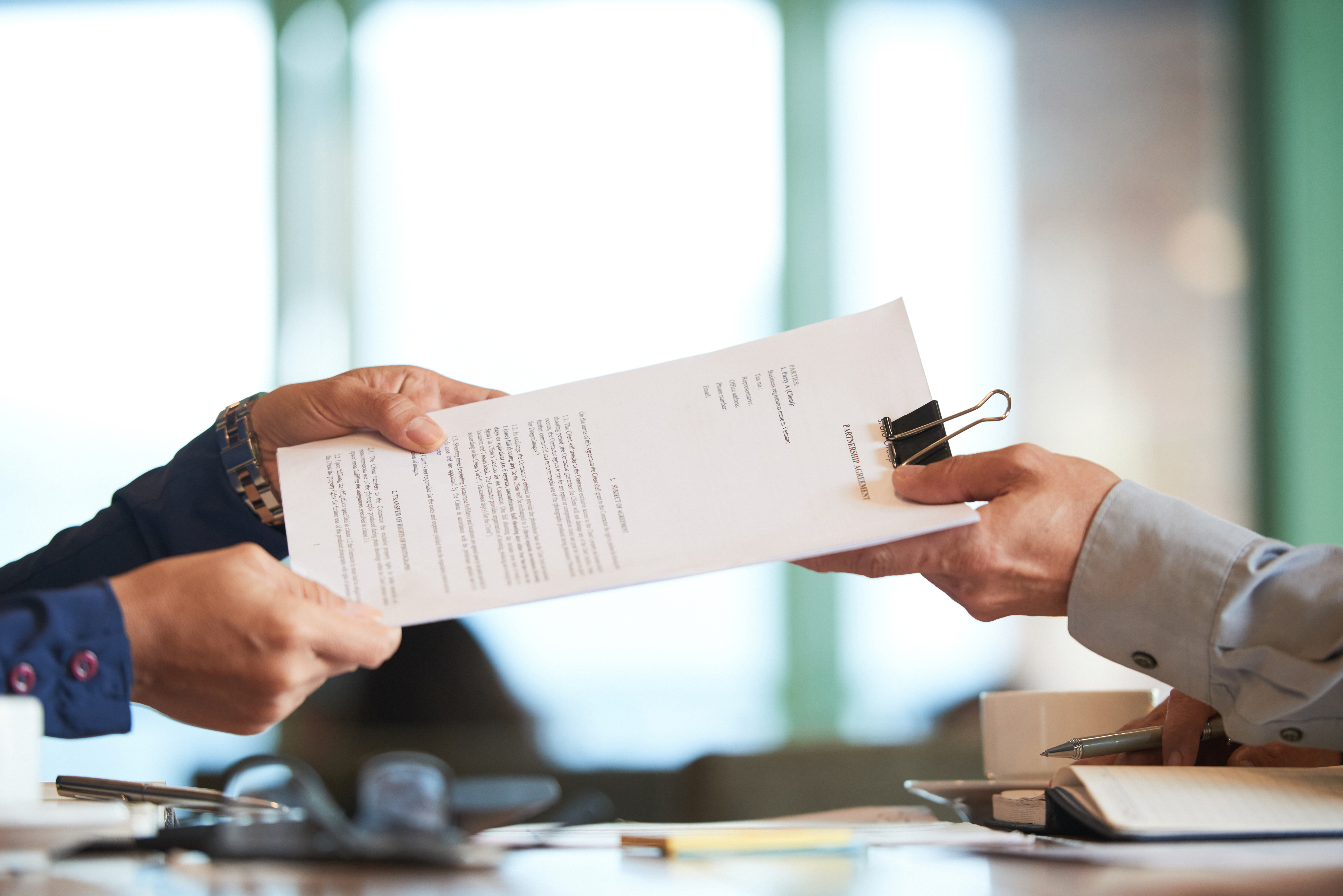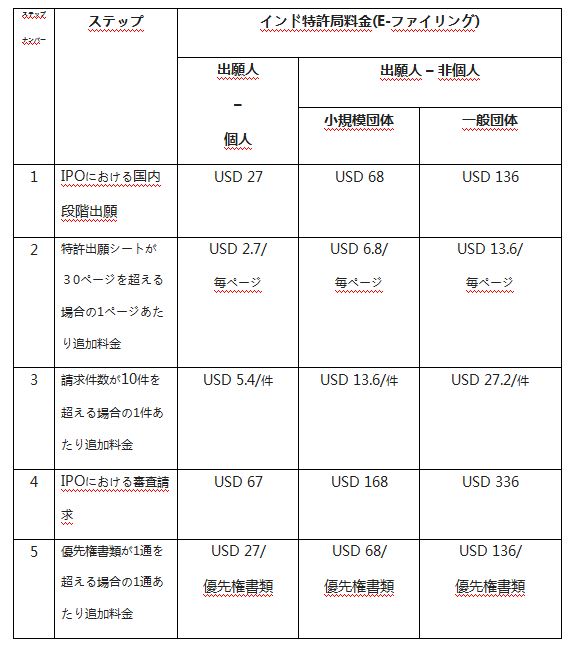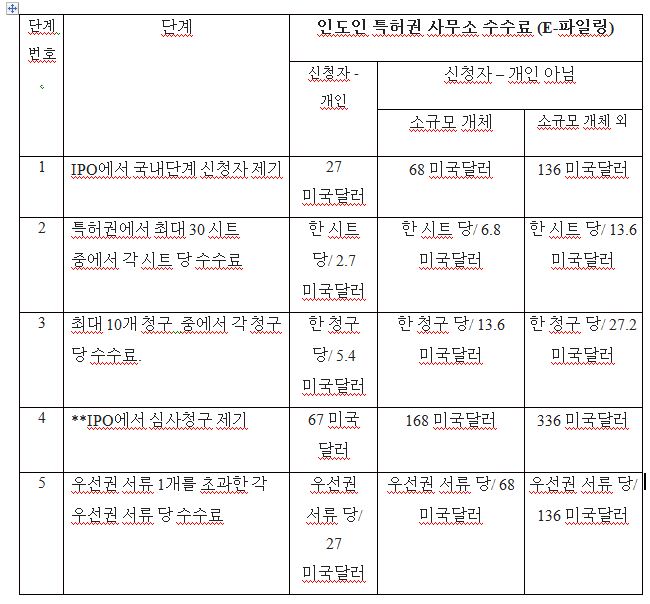Tag Archives: NP filing india
Proof of Right requirements for PCT national phase applications

According to Section 6 of the Patents Act, an application for a patent can be made by a true and first inventor, an assignee of the inventor, or a legal representative of any deceased person who immediately before his death was entitled to make such an application. Further, in cases, where an application is made by an assignee of the true and first inventor, according to Section 7(2) of the Act, the applicant is required to furnish a “proof of right” within six months from the date of filing. In case of a Patent Cooperation Treaty (PCT) national phase application, a separate proof of right document need not be submitted in India, provided a declaration under PCT Rule 4.17(ii) had been submitted before the World Intellectual Property Organisation (WIPO). This was reaffirmed by the IPAB in its order dated October 27, 2020.
Facts of the case
The Appellant Dow AgroSciences LLC, referred to as DOW hereinafter, filed a PCT national phase application 8373/DELNP/2014 on Oct 08, 2014. It shall be noted that, during the filing of the national phase application, the Appellant submitted the PCT document – PCT Declaration under Rule 4.17(ii) supporting the ‘Applicant’s entitlement to apply for or be granted a patent’, thereby complying with the proof of right requirement. However, in the first examination report (FER) dated June 20, 2018, the Respondent (Patent office) raised an objection that proof of right has not yet been filed according to Section 7(2) of the Act. The Appellant responded by pointing out that a declaration under Rule 4.17(ii) has been filed in place of proof of right.
Despite this submission, the Respondent raised the same objection in the hearing notice. Once again the Appellant responded by pointing out Rule 51bis 2(ii) of PCT guidelines which states that “a designated office shall not require any document/evidence for applicant’s entitlement to apply for Patent, if declaration under Rule 4.17 (ii) is complied with PCT request, unless, it may reasonably doubt the veracity of the declaration, it is humbly submitted that the said declaration should be sufficient and no further evidence/document may be required of the applicant in this context.”
The Respondent, on Jan 30, 2020 issued a decision rejecting the application on the ground of non-filing of proof of right. In the decision, the Respondent cited an earlier order passed by IPAB in NTT DoCoMo Inc. v Controller of Patents and Designs to support the decision. Further, the Appellant made an appeal with the IPAB under Section 117A of the Act against the decision of the Respondent.
Findings and Inferences
The IPAB after examining the appeal, listening to the arguments and analyzing the facts and rules set forth in the PCT treaty and Indian Patents Act, pointed out that the case (NTT DoCoMo Inc. v Controller of Patents and Designs) under reference was based on different facts. The petitioner therein had contention that they had preferred a conventional application which is governed by section 135 of the Patents Act, 1970 and as per section 135, it is clear that section 6 is applicable only to ordinary application and not to conventional applications. Further, the board pointed out that no indication was available to suggest that the Respondent at any point of time had shown a reasonable doubt on the veracity of the indications or declaration concerned. There was no objection on its format either. In case of any doubt on veracity of the declaration, the Respondent could have required any further document or evidence to substantiate the contention of the appellant, in accordance with Rule 51bis.2 of the Regulations under Patent Cooperation Treaty (PCT) but no such finding were available on records. While stating that the Respondent did not take into account the comprehensive look on the legally accepted norms by which the requirements of filing proof of right could be satisfied, it showed utter obstinateness on the part of the Respondent. Upon making these observations, the board set aside the decision issued by the Respondent and directed the Respondent to grant the patent to the Appellant.
There are few key takeaways from the order issued by the IPAB. Firstly, it is clear from the order that the furnishing of PCT declaration under Rule 4.17(ii) for a PCT national constitutes to proof of right. Therefore, for PCT national phase applications there is no need to submit the proof of right as the declaration under Rule 4.17(ii) would suffice. This negates the need of additional documentation work involved in preparing and filing the proof of right. Secondly, the order also provides a clear cut guidelines to the patent office that if the patent office has reasonable doubt on the veracity of the indications or declaration, it may raise it with the applicant and may further ask the applicant to provide any document or evidence to refute the patent office’s contention. This observation provides the applicant a chance to make necessary submissions to counter the patent office’s contention.
Conclusion
The important thing to be noted here is that, the applicant shall submit a PCT declaration under Rule 4(ii) and need not submit a proof of right only in cases where the assignee and the inventor in the national phase application is same as that in the international application. In a situation where there is a change in the assignee or the inventor after filing the international application and before filing the national phase application, a notification issued by the International Bureau through Form PCT/IB/306 denoting the change in the assignee or the inventor, a form requesting change in the applicant of the national phase application, and a separate proof of right shall be submitted to the patent office. Further, in a situation where the International Bureau has not issued a notification issued by the International Bureau through Form PCT/IB/306 denoting the change in the assignee or the inventor, the applicant should file the national phase application in the name of original assignee and later should submit a form requesting change in the applicant of the national phase application and a separate proof of right.
We hope this article was a useful read.
Please feel free check our services page to find out if we can cater to your requirements. You can also contact us to explore the option of working together.
Best regards – Team InvnTree
This work is licensed under a Creative Commons Attribution-Non Commercial 3.0 Unported License
PCT出願に次ぎインドにおける国内特許出願をファイリング
PCT (特許協力条約) 出願は、一般的に「国際出願」と認識され、目標であるPCT加盟国において特許出願人がファイリングする特許出願を優先日から30ヶ月あるいは31ヶ月以内に促進させるものである。
PCT出願に基づく各PCT加盟国においてファイリングされた特許出願はあまねく「国内段階出願」と呼ばれている。
タイムライン
インドでは、国内段階出願はPCT出願の優先日から31ヶ月以内にファイリングすることができるにしても、時間が延長できない。
必要な言語
インドにおける国内段階出願は英語またはヒンディ語(公式言語)で行うことができる。ヒンディ語は一つのオプションでありながら、インド人の出願人まで特許出願をファイリングする際に英語の方を選択するということで、実際的には、英語で国内段階出願をファイリングした方がいいと思われている。
英語で翻訳された優先権書類はPCT出願の優先日から31ヶ月以内にファイリングしなければならないということに注目すべきである。
審査
インド特許局(IPO) は、出願人が審査請求を行ってから国内段階出願を待ち行列に入れるため、なるべく早く審査申請を行うことが勧められている。
出願人は、優先日から48ヶ月以内に審査申請を行うことができる。48ヶ月以内に審査申請を行えない状況になったら、特許出願が失敗になる恐れがある。
一方、出願人が31ヶ月前に国内段階出願をファイリングすることに成功して審査申請を行ったとしても、IPOはその国内段階出願を31ヶ月後のみに待ち行列に入れることにする。もし、出願人がIPOに国内段階出願を31ヶ月前にしてほしいならば、料金(上表に記載されている)を支払ってエクスプレスリクエストをすることが勧められている。
出願は審査の行列を入れられた場合は、IPOが最初の審査報告書(FER)審査請求日から6ヶ月以内に送付されることになっている。しかし、IPOの仕事量によって、実際は審査報告書が送付されるまで、もっと長い時間を要する。
FERが一旦発行されたら、出願人が審査員による異議を解決する期間は12ヶ月となる。 法定費用は特許出願人の類別によって決められている。インド特許局(IPO)は出願人を3つに分けている。
1. 自然人
2. 非自然人
3. 非自然人– 非小規模団体
特許を出願する個人は自然人とされる。一方、団体は他の2つの類別に属する。
1. 非自然人– 小規模団体
2. 非自然人– 非小規模団体
例えば、会社といった法人団体はこういう類別に属する。1通の特許出願には複数の出願人が存在する場合があって、その中では第一類に属しない出願人が存在したとしても、この特許出願をファイリングする出願人は他の類別に属すると考えられている。
非自然人である出願人は下記の2つの類別に属する。
1. 非自然人– 小規模団体
2. 非自然人– 非小規模団体
特許局は自然人の出願人から最低限の料金を、非自然人–非小規模団体の出願人から最大限の料金を徴収する。また、特許局が非自然人–非小規模団体の出願人から徴収する料金は非自然人–小規模団体の出願人が支払う額の2倍である。非自然人の出願人が「小規模団体」資格を請求する場合は、こちらをご覧ください。
国内段階出願をファイリングするためのIPO費用は下記の通りである:
Cost estimate has been emailed
Failed Message
Cost estimate has been not emailed
No. of pages in the specification
- The Indian Patent office charges an additional fee for each additional page over 30.
- The total number of pages includes description, claims, drawings and sequence listing if any.
- The margins requirements are 4 Cms at top, 4 Cms on left, 3 Cms at bottom and 3 Cms on right. Line spacing is 1.5.
No. of claims
- The Indian Patent office charges an additional fee for each additional claim over 10 claims.
- There is no restriction on the type of claims. The claims can be independent,dependent or multi-dependent. Only additional fee per claim is charged for each additional claim above 10 claims.
No. of priorities claimed
- The Indian Patent office charges an additional fee for each additional priority document over 1 priority.
- While calculating the number of priorities, PCT application is not considered a priority. If the PCT application itself is the priority application, then it is considered as a priority application.
Request for examination:
- The deadline to file an examination request in the Indian Patent office is 48 months from the earliest priority date.
- It is however, recommended to file the examination request along with the application, since the application is queued for examination, only upon filing the examination request.
- The fee mentioned in this calculator is for the normal examination request. It is recommended to file an express examination request, if the national phase application is filed much earlier than the 31 month deadline. By filing an express examination request, the application is put in queue immediately upon filing the application. If a normal examination request is filed, the application is put in queue for examination only after 31 months from the priority date.
Applicant type
- Any individual(s) applying for a patent is considered as a natural person. To be considered as natural persons, all the applicant(s) should be individuals.
- Applicants wishing to claim Start-up Status, need to provide proof of being a Start-up. To know more about this, you can read our article
- Applicants wishing to claim Small Entity Status, need to provide proof of being a small entity. To know more about this, you can read our article.
- Entities who do not qualify as either individuals or start-ups or small entity, will be considered as large entity
特例
仕様修正
IPOによってファイリングされる特許仕様はWIPOにおけるPCTの下でファイリングされるものと同じでなければならない。PCTの下でなされた修正案19及び34は IPOに通用するとされている。
国内段階出願をファイリング際に、出願人が修正された仕様(PCT仕様と比較)のファイリングを希望する状況がある。そういう状況では、最初からPCTの下でその仕様をファイリングしておかなければならない。そうすれば、出願人は所定の手数料を支払って、特許仕様を修正する出願に加えて、修正された仕様をファイリングすることができる。
この文章によって、インドにおける国内段階出願をファイリングする際のニュアンスをご理解いただきたいと存じております。下記の文章をお気に召されたら幸いでございます:
· インドでは、特許出願をファイリングしてから審査を受けるまでどのくらいかかる?
InvnTreeには国内段階出願及び訴追の専門家が在籍しております。お手伝いが必要な場合は、[email protected] にてお気軽にお知らせください。
敬具
Team InvnTree
PCT 신청 제기 이후 인도에서 국내 단계 상표 신청 제기
“국제적 신청”으로서 정상적으로 언급된, PCT (지식재산권) 신청은, PCT 신청의 우선일로부터 30 혹은 31 개월 이내에 신청된 PCT 멤버 국가에서 특허 신청부터 특허 신청 제기까지 가능하게합니다.
CT 신청의 기반 중 개인 PCT 멤버 국가에서 제기된 특허 신청은 일반적으로 “국내 단계 신청” 으로 언급됩니다.
시각표
인도에서, 국내 단계 신청은 PCT 신청 우선일로부터 31개월 이내에 제기될 수 있습니다. 인도는 국내 단계 신청 제기를 하는 최대 시간을 제공하지 않습니다.
언어 요건
인도 국내 단계 신청은 영어 혹은 힌디어 (공식적 언어) 둘다 가능합니다.
힌디어가 선택사항인 반면에, 인도인 신청자는 영어로된 특허권 신청 제기를 고를 수 있습니다.
이런 이유로, 모든 실용적 용도를 위해, 하나는 영어로 국내 단계 신청을 제기하는 것을 고려해야합니다.
만약 PCT 신청의 우선권 서류가 영어가 아니라면, 이것은 영어로 된 특허권 신청을 제기하는 것 외에, 그 다음에는 영어로 번역된 우선권 서류는 PCT 신청의 우선일로부터 31개월 이내에 제기되어야한다는 것을 알고 계시길 바랍니다.
심사
인도 특허권 사무소 (IPO)는 신청자가 심사청구제도를 제기한 후에만 심사를 위한 국내 단계 신청을 대기할 수 있습니다. 이런 이유로, 이것은 일러도 심사를 위해 권할만 합니다.
신청자는 우선일로부터 48개월 이내에 심사청구를 제기할 선택사항을 가지고 있습니다. 48개월 이내 심사를 위한 청구를 실패하는 것은 특허권 신청을 버리는 것으로 간주됩니다.
반면에, 만약 신청자가 31개월 전에 국내 단계 신청과 심사청구 또한 제기한다면, IPO는 오직 31개월 후에만 심사를 위한 국내 단계 신청을 대기할 수 있습니다. 신청자가 31개월 이전에 심사를 위한 국내 단계 신청 대기를 하려 IPO를 원하는 경우에는, 청구 표현은 적절한 수수료(아래 표에 제공된 수수료)를 지불함으로써 만들어질 것입니다.
신청자가 심사동안 대기가 되었을 때, IPO는 첫 번째 검사보고서 (FER)를 심사동안 대기된 신청일로부터 6개월 이내에 발부하기로 되어있습니다. 그러나, 이것은 보통 IPO에서의 업무량을 소유한, FER을 받으려면 지속적으로 더 많은 시간이 걸립니다.
FER가 발부되었을 때, 신청자는 심사위원에 의해 제기된 이의와 보조금을 위한 신청에 대해 고심하는 12개월을 가지게 됩니다.
법으로 정한 수수료는 특허권의 신청자에 따라 결정돕니다. 인도인 특허권 사무소 (IPO)는 3개의 목록으로 신청자가 분류되어져있습니다:
1. 자연인
2. 자연인 외
3. 자연인 외 – 소규모 개체를 제외한 외
특허권을 위한 개인 신청은 자연인으로 간주됩니다. 반면에, 모든 다른 개체들은 첫 목록 아래에 속하면 안되고, 남은 아래의 두 목록에 속해야합니다:
1. 자연인 외 – 소규모 개체
2. 자연인 외 – 소규모 개체를 제외한 외
예를 들어, 법적 개체와 같은, 회사들은 이 아래의 목록에 속해야합니다. 특허권 신청이 한 명의 신청자보다 더 많이 가질 수 있고, 만약 신청자 중의 한 명이 아래의 첫 목록에 속하지 않는다면, 특허권 신청은 남은 두 목록의 신청자에 의해 제기되어 고려된다는 것을 알고 계시길 바랍니다.
자연인 외의 지원자는 아래의 두 목록으로 분류됩니다.
1. 자연인 외 – 소규모 개체
2. 자연인 외– 소규모 개체를 제외한 외
특허권 사무소는 자연인의 신청자에게 최소한의 수수료만을 청구합니다. 특허권 사무소는 자연인과 자연인 외의 소규모 개체를 제외한 외 사이의 소규모 개체의 자연인 외 지원자에게도 청구합니다. 특허권 사무소는 자연인 외의 소규모 개체의 자연인 외의 자연인 외 신청자에게 최대의 수수료를 청구합니다. 특허권 사무소는 “자연인 외 – 소규모 개체를 제외한 외”의 신청자와 비교하여 “자연인 외 – 소규모 개체”로부터 2배의 수수료를 받습니다. 일정 요건은 “소규모 개체” 지위를 주장하길 바라는 자연인 외 신청자에 의해 만나야합니다. 귀하는 저희의 조항 article. 에서 더 많은 것을 보실 수 있습니다.
국내 단계 신청 제기를 위한 IPO 수수료는 아래에 제공되어져있습니다:
Cost estimate has been emailed
Failed Message
Cost estimate has been not emailed
No. of pages in the specification
- The Indian Patent office charges an additional fee for each additional page over 30.
- The total number of pages includes description, claims, drawings and sequence listing if any.
- The margins requirements are 4 Cms at top, 4 Cms on left, 3 Cms at bottom and 3 Cms on right. Line spacing is 1.5.
No. of claims
- The Indian Patent office charges an additional fee for each additional claim over 10 claims.
- There is no restriction on the type of claims. The claims can be independent,dependent or multi-dependent. Only additional fee per claim is charged for each additional claim above 10 claims.
No. of priorities claimed
- The Indian Patent office charges an additional fee for each additional priority document over 1 priority.
- While calculating the number of priorities, PCT application is not considered a priority. If the PCT application itself is the priority application, then it is considered as a priority application.
Request for examination:
- The deadline to file an examination request in the Indian Patent office is 48 months from the earliest priority date.
- It is however, recommended to file the examination request along with the application, since the application is queued for examination, only upon filing the examination request.
- The fee mentioned in this calculator is for the normal examination request. It is recommended to file an express examination request, if the national phase application is filed much earlier than the 31 month deadline. By filing an express examination request, the application is put in queue immediately upon filing the application. If a normal examination request is filed, the application is put in queue for examination only after 31 months from the priority date.
Applicant type
- Any individual(s) applying for a patent is considered as a natural person. To be considered as natural persons, all the applicant(s) should be individuals.
- Applicants wishing to claim Start-up Status, need to provide proof of being a Start-up. To know more about this, you can read our article
- Applicants wishing to claim Small Entity Status, need to provide proof of being a small entity. To know more about this, you can read our article.
- Entities who do not qualify as either individuals or start-ups or small entity, will be considered as large entity
특별한 경우
설명서 개정
IPO에 제기된 특허권 설명서는 WIPO의 PCT 단계에서 제기된 설명서와 같아야한다는 것을 알아두시길 바랍니다. PCT 단계 동안에 만들어진 19 그리고 34개의 개정 조항은, IPO에서 또한 제기될 수 있습니다.
국내 단계 신청 제기동안 신청자가 개정된 설명서 (PCT 설명서와 비교된) 제기를 신청자가 바란다는 점에서 시나리오가 될 수 있습니다. 그런 시나리오에서, PCT 단계에서 나타나는 설명서는 국내 단계 신청 제기 동안에 처음에 제기될 수 있습니다. 그 뒤에, 신청자는 규정된 수수료를 지불함으로써 특허권 설명서를 개정하려는 신청서 중에서 개정된 설명서를 제기할 수 있습니다.
저희는 이 조항들이 귀하가 인도인 국내 단계 신청 제기에서 포함된 뉘앙스를 이해하는데 도움이 되기를 바랍니다. 귀하는 또한 저희의 다른 조항들에 흥미를 가지실 수 도 있습니다:
InvnTree에서, 저희는 국내 단계 신청 제기에서 인정받는 전문가들을 가지고 있고 그들이 담당합니다. 도움이 필요하시다면 언제든지 [email protected] 로 메일을 보내주세요.
감사합니다,
Team InvnTree

 Follow
Follow



